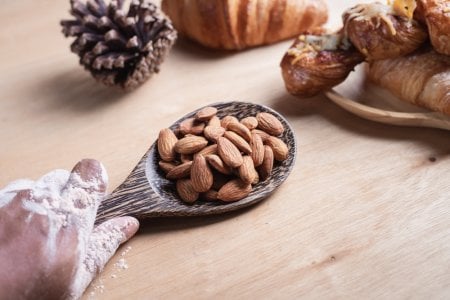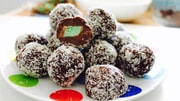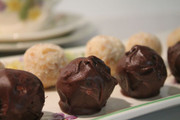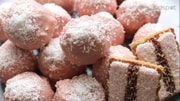This One Kitchen Mishap Could Ruin Your Wooden Spoons
- Replies 8
Ah, the kitchen, the heart of the home, where culinary magic is crafted through a symphony of pouring, chopping, and stirring. It's a sanctuary where we've honed our skills and acquired a wealth of knowledge on how to keep our space safe, clean and hygienic.
But today, we want to focus on one particular aspect that is often overlooked, yet crucial to preserving the longevity of our beloved kitchen utensils. We're talking about the common mistake of boiling wooden spoons, a cleaning tip that may seem harmless, but in reality, it can wreak havoc on these kitchen staples if not handled with care.
A video of this supposed hack is doing the rounds on TikTok, and has, if you’ll pardon the pun, caused quite a stir. It shows a tall glass of boiling water with a wooden spoon placed inside it, resulting in murky, cloudy water and bits of food.
‘Well, there goes the seasoning’, quipped one user.
‘I'm not doing this to my years old wooden spoons. I don't wanna know. It boosts my immune system’, added another.
Although the video is somewhat shocking, here at the SDC we think it’s safer and wiser to steer clear of this technique.
Let’s first consider why people are doing this. TikTok users claim that wooden spoons get dirtier than your regular utensils and therefore this boiling process will get rid of the germs and bacteria.
However, we don’t think boiling your wooden spoons is necessary from a hygiene point of view. As Lifehacker’s Senior Health Editor, Beth Skwarecki explains: ‘From a food safety standpoint, washing with soap and water and letting it dry is enough.’
Her colleague, Claire Lower, ran a test to confirm this. She submerged an old wooden spoon of hers in boiling water and after 20 minutes, noticed a brown tint in the water but no food bits or build-up floating around.
The only benefit Lower noticed was that the boiling process seemed to reduce lingering garlic smells which had been stuck in the spoon for years.
As All Recipes further points out, wood is ‘naturally equipped with more antibacterial properties than any synthetic object because trees have the innate ability to fight off infection, bacteria, and mould, and wood retains those properties even in death.’
The trouble with boiling wooden items is that it reduces their life span. As One Good Thing notes:
‘The way the grease and oils rise to the top of the water makes this cleaning hack seem like a real winner, but after watching it, I had a nagging feeling I was missing something important. And then it occurred to me—wooden utensils are supposed to have oil in them, because it conditions the wood and helps prevent it from drying out and splitting.’

Therefore, your go-to should be simple: wash with soap and water, let it air dry, and get into the habit of lubricating it with mineral oil or walnut, tung, or linseed oil.
For that extra bit of germ-fighting power, throw in a bit of white vinegar and leave your wooden spoon to rest overnight. Woosh – off come those pesky food particles in one clean sweep!
Members, we urge you to take extra care of wooden items you may use around the kitchen. Stick to regular cleaning practices and you’ll see these favourites last you for years!
But today, we want to focus on one particular aspect that is often overlooked, yet crucial to preserving the longevity of our beloved kitchen utensils. We're talking about the common mistake of boiling wooden spoons, a cleaning tip that may seem harmless, but in reality, it can wreak havoc on these kitchen staples if not handled with care.
A video of this supposed hack is doing the rounds on TikTok, and has, if you’ll pardon the pun, caused quite a stir. It shows a tall glass of boiling water with a wooden spoon placed inside it, resulting in murky, cloudy water and bits of food.
‘Well, there goes the seasoning’, quipped one user.
‘I'm not doing this to my years old wooden spoons. I don't wanna know. It boosts my immune system’, added another.
Although the video is somewhat shocking, here at the SDC we think it’s safer and wiser to steer clear of this technique.
Let’s first consider why people are doing this. TikTok users claim that wooden spoons get dirtier than your regular utensils and therefore this boiling process will get rid of the germs and bacteria.
However, we don’t think boiling your wooden spoons is necessary from a hygiene point of view. As Lifehacker’s Senior Health Editor, Beth Skwarecki explains: ‘From a food safety standpoint, washing with soap and water and letting it dry is enough.’
Her colleague, Claire Lower, ran a test to confirm this. She submerged an old wooden spoon of hers in boiling water and after 20 minutes, noticed a brown tint in the water but no food bits or build-up floating around.
The only benefit Lower noticed was that the boiling process seemed to reduce lingering garlic smells which had been stuck in the spoon for years.
As All Recipes further points out, wood is ‘naturally equipped with more antibacterial properties than any synthetic object because trees have the innate ability to fight off infection, bacteria, and mould, and wood retains those properties even in death.’
The trouble with boiling wooden items is that it reduces their life span. As One Good Thing notes:
‘The way the grease and oils rise to the top of the water makes this cleaning hack seem like a real winner, but after watching it, I had a nagging feeling I was missing something important. And then it occurred to me—wooden utensils are supposed to have oil in them, because it conditions the wood and helps prevent it from drying out and splitting.’
Key Takeaways
- Boiling your wooden spoons might seem like a great hack for cleaning them, however, it is not necessary and can even damage the wood. Instead, wash wooden spoons with soap and water and make sure to let them air dry
- After each use, you should also treat wooden utensils with oil to keep them conditioned and prevent cracking
- If your wooden utensils are stubbornly caked with food, you can give them an overnight soak in a mixture of equal parts white vinegar and water to get rid of the leftover bits and disinfect them
Therefore, your go-to should be simple: wash with soap and water, let it air dry, and get into the habit of lubricating it with mineral oil or walnut, tung, or linseed oil.
For that extra bit of germ-fighting power, throw in a bit of white vinegar and leave your wooden spoon to rest overnight. Woosh – off come those pesky food particles in one clean sweep!
Members, we urge you to take extra care of wooden items you may use around the kitchen. Stick to regular cleaning practices and you’ll see these favourites last you for years!








